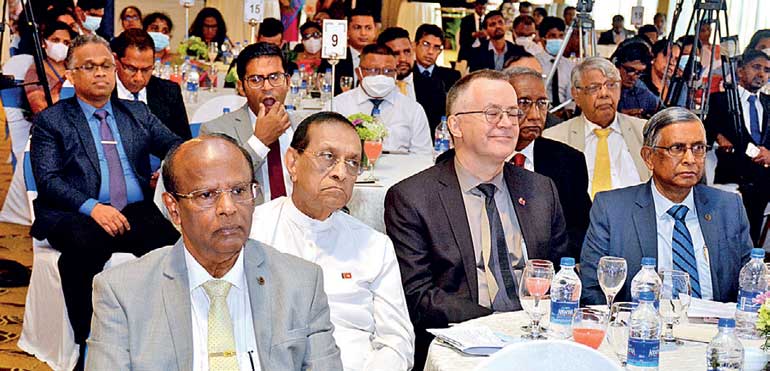Tuesday Feb 24, 2026
Tuesday Feb 24, 2026
Tuesday, 1 November 2022 00:00 - - {{hitsCtrl.values.hits}}

By Charumini de Silva
Top global experts yesterday highlighted the importance of digitalisation, innovation, sustainability, transparency and governance for Sri Lanka to overcome the ongoing economic crisis and to address the alarming challenges ahead of a looming global recession.
|
International Federation of Accountants President Alan Johnson |
|
TCS Asia-Pacific President |
They shared the key insights at the inauguration of the two-day CMA National Management Accounting Conference 2022 titled ‘Crises an Opportunity to Re-Build Sri Lanka’ yesterday.
Delivering the keynote address, Tata Consultancy Services Asia Pacific President Girish Ramachandran opined that Sri Lanka should strengthen its digital infrastructure to transform the economy and business.
Attributing to India’s digital surge, Ramachandran suggested that it was timely for Sri Lanka to also collectively decide on a wider vision for making technological innovation a core channel to achieve development goals, transform lives, and overcome the ongoing economic crisis.
“Digital foundation will empower people across the world irrespective of their backgrounds. Whilst the enterprises build their businesses robustly, the role of the Government is to build the ‘digital spine’, so that businesses can leverage on the digital infrastructure,” he stressed.
He also outlined digitalisation, innovation, and sustainability as the three key pillars of growth in the post-COVID recovery era for the world.
“Post-pandemic and economic crisis have disturbed the lives and livelihoods, but if there is any silver lining – it is the collaborations between the countries and the power of technology to solve the gaps which existed in the status quo,” he added.
With warnings of the looming challenges in the areas of jobs and upskilling, climate change, ageing population, urbanisation and food security as cited in the World Bank report, he asserted that although technology is not a panacea to all issues of Sri Lanka, technology transformation has considerable answers to address them.
“Employment can be addressed by enabling remote work, which will also help to address rapid urbanisation. Focus on automation could help productivity and create new jobs. Data analytics could be deployed to predict health issues and monitor senior citizens for their inactivity. The serious outcomes in medical ecosystems cannot be considered negligible. Use of technology can also reduce the carbon footprint and minimise energy consumption,” he explained.
He said digital skills today have become a necessity for most employees, creating more economic opportunities for countries.
“Around 2/3 workers in Asia think they did not gain sufficient digital skills fast enough to meet future career needs. Astonishing 93% of workers in enterprise face obstacles to up-skill digital knowledge due to lack of time and limited training opportunities. Recognising the importance of digital transformation and upskilling, the Governments are stepping up their efforts to boost intellectual properties and human capital,” he added.
Noting that the global supply chain chaos clearly shows no signs of improvements, he said the escalation of geopolitical rivalries among Ukraine and Russia as well as between economic power-houses the US and China have spiral effects on all economies including our part of the world, with the threat of a recession looming larger in the past few months.
Ramachandran also called on Sri Lankan enterprises to reflect on long-term value to changeover for a better world.
“New digital ecosystems are already visible, reshaping consumer-producer interactions in agriculture, healthcare, retail, logistics, and other sectors. Channelling technological innovation to strengthen a wider economy is a tried and tested way to boost growth while strengthening the foundation for future success simultaneously,” he pointed out.
International Federation of Accountants Council President Alan Johnson said professional accountants are considered the most trusted society all over the world.
“I see professional accountants as enablers. They lead the future sustainability by guiding Governments and organisations. They can deliver value in decision-making and reporting by providing a timely view of performance and sustainability, which acknowledges the complexity of modern business models and encompasses financial and non-financial indicators,” he explained.
Noting that integrated thinking and reporting will continue to be fundamental components of creating a more sustainable and inclusive global economy, he cautioned there is not much time for economies to achieve the United Nations’ Sustainable Development Goals (SDGs) by 2030.
“The United Nations estimates that $ 5 to 7 trillion worth of annual investments are needed to achieve the SDGs, whilst $ 3.6 trillion is said to be lost to corruption each year. To make the 2030 Agenda a reality, we as accountant professionals have a direct role to play to tackle corruption. We need to enhance transparency and accountability in the public and private sectors,” he explained.
Johnson also said the accountancy profession has long supported the development of smart regulatory frameworks that promote compliance by balancing the needs of
all stakeholders.
“Until implemented, these goals will remain as just another document. With the right frameworks in place, the global accountancy professions are uniquely placed to change this landscape to help deliver the necessary progress to reach the UN SDGs and improve the lives of people throughout the world,” he added.
Acknowledging the difficulties faced by Sri Lanka, he said accountability and transparency are important to overcome the situation.
“Through audits and advising organisations, accountants should regularly help the public and private sectors, and society at large, in the fight against economic crimes including money laundering and fraud. Compliance and anti-corruption action plans are key factors to boost the level of trust and confidence in the profession and improve the economy,” Johnson said.
He also called for high levels of transparency and governance, to ensure a vibrant profession and virile economy.
Pix by Upul Abeysekara